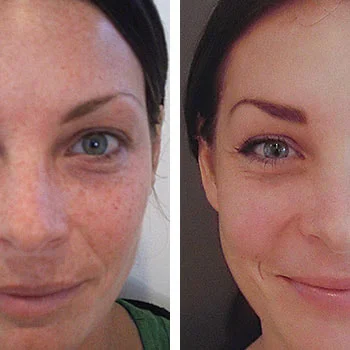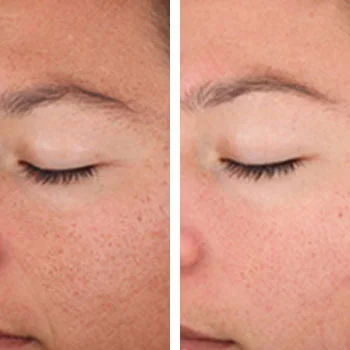PCA Chemical Peels in Orlando, FL
Chemical Peels in Orlando
Apex Medspa in Orlando has partnered with the experts at PCA SKIN who have devoted 25 years to the development of highly effective chemical peels that safely treat all skin types and skin conditions.
PCA Skin Peels in Orlando
PCA SKIN peels are essential to overall skin health causing little to no discomfort, minimal visible exfoliation and provide added nutrients for faster, more dramatic results for beautifully glowing skin.
Apex Medspa offers different peels to target the four main skin concerns: AGING/MATURE, DISCOLORATION, ACNE, SENSITIVE/ROSACEA
Ultra Peel
Ultra Peel I was specially formulated to treat maturing skin while promoting even skin tone and clear complexion for all skin types, conditions and sensitivities. PCA uses 10% TCA solution for superficial and medium-depth peeling to improve the appearance of fine lines and wrinkles. 20% Lactic Acid is also used as part of the skin’s natural moisturizing factor to moisturize the skin as well as exfoliate. Azelaic Acid and Kojic Acid help to promote a clear complexion and even skin tone.(1 hr)
Not sure which chemical peel to choose?
That’s OK!!! Our friendly team of medical aesthetics experts is here to offer you complimentary skin analysis and consultations to help you make an informed decision about which peel and treatment path is best for you! Contact us today for more information.
Are Chemical Peels Safe?
Chemical Peels are treatments that use chemicals to improve texture, color tone and more. They can stimulate collagen growth and reduce fine lines on the face. Well tolerated by most skin types, chemical peels are usually not irritating or damaging if used properly.
In rare cases, some skin types may be too thin for chemical peels. Others have an unknown history of blistering diseases or conditions that prevent them from being good candidates for chemical peels. Whether you are a good candidate for a chemical peel depends on your skin type, medical history and the strength of the solution being used during the procedure.
What Are the Benefits of Chemical Peels?
Chemical peels are used both cosmetically and medicinally, depending on various factors such as severity of damage or disease state. Most commonly they are used for cosmetic purposes in order to improve wrinkled skin texture and sun-spotted complexion. It can even be done around the eyes after sufficient amounts of collagen have been restored naturally through other treatments like PRP injections or Ultherapy.
Why Are Chemical Peels Good for Your Skin?
Chemical peels are non-surgical treatments that involve the application of a chemical solution to the skin. The solution causes the damaged outer layers of the skin to slough off, exposing fresh new skin. This fresh layer is usually smoother and less wrinkled than the old skin because it contains more collagen.
Because chemical peels remove dead skin cells, they also help other anti-aging treatments penetrate further into your dermis, where wrinkles are formed. By removing these dead cells, chemical peels may also improve sun damaged skin and pigmentation problems such as age spots or melasma . They can even reduce acne scars.
Chemical peels can help skin turn over collagen faster. Because your body produces natural collagen at a slower pace, using chemical peels to increase collagen production can help your skin look firmer.
Are Chemical Peels Good for Acne?
Chemical peels are effective on acne and other blemishes; this is a common cosmetic procedure for many people when it comes to acne.
Are Chemical Peels Good for Wrinkles?
Chemical peels are effective in reducing wrinkles caused by sun damage, smoking, aging, or other environmental factors. The most noticeable improvements occur after at least two to three sessions spaced two weeks apart.
There are different types of chemical peels that safely reduce wrinkles without causing permanent damage.
Are Chemical Peels Good if You Have Rosacea?
Chemical peels alongside normal rosacea treatment can do wonders for your skin’s appearance.
Chemical peels are effective in reducing redness and blotchy areas caused by rosacea. Many doctors recommend chemical peels in combination with other treatments to reduce facial redness associated with rosacea. However, it is important to note that chemical peel treatments may temporarily increase redness due to inflammation, but only for a short time.
Will Chemical Peels Remove Dark Spots?
The type of chemical peel determines how it works to remove dark spots. Postinflammatory hyperpigmentation (PIH) is a common skin condition where skin becomes darker after an inflammatory event like acne or injury. Some doctors may suggest TCA (trichloroacetic acid) peels at low concentrations in addition to other treatments to help fade PIH symptoms. Other types of chemical peels work best on age spots, which are also referred to as sunspots or liver spots. These can be caused by aging or frequent exposure to ultraviolet (UV) rays.
Can Chemical Peels Help Hyperpigmentation?
Chemical peels can reduce the appearance of hyperpigmentation, as they are helpful in many instances of uneven skin pigmentation. Some peels may help reduce the appearance of acne scars, as well. TCA is one type of chemical peel that may be effective for certain skin types and conditions.
Can Chemical Peels Remove Scars?
Chemical peels are sometimes referred to as scar removal treatments because they can effectively reduce scars caused by acne. However, there aren’t many cases in which chemical peels alone will remove acne scars completely, and they cannot remove deep scars that result from cuts.
Are Chemical Peels Painful?
Chemical peels usually involve little to no discomfort. The ingredients used in the peels are at low concentrations that do not cause pain to the skin. Some people feel a slight stinging sensation when the peel is placed on the skin—however, this does not affect them for more than a few minutes.
What is the Recovery Process Like?
The recovery process after a chemical peel treatment is similar to that of a mild sunburn. Your skin will be tight and dry immediately following the procedure. It may also look red or feel tender for a few days until new skin cells grow in their place. Patients typically apply moisturizer to their skin two to three times per day for a few days following treatment.
How Safe are Chemical Peels?
Chemical peels are very safe when performed correctly. However, it is important to note that chemical peel treatments may temporarily increase redness due to inflammation, but only for a short time.
Patients will also typically use moisturizers to ensure their skin remains hydrated during the recovery process.

